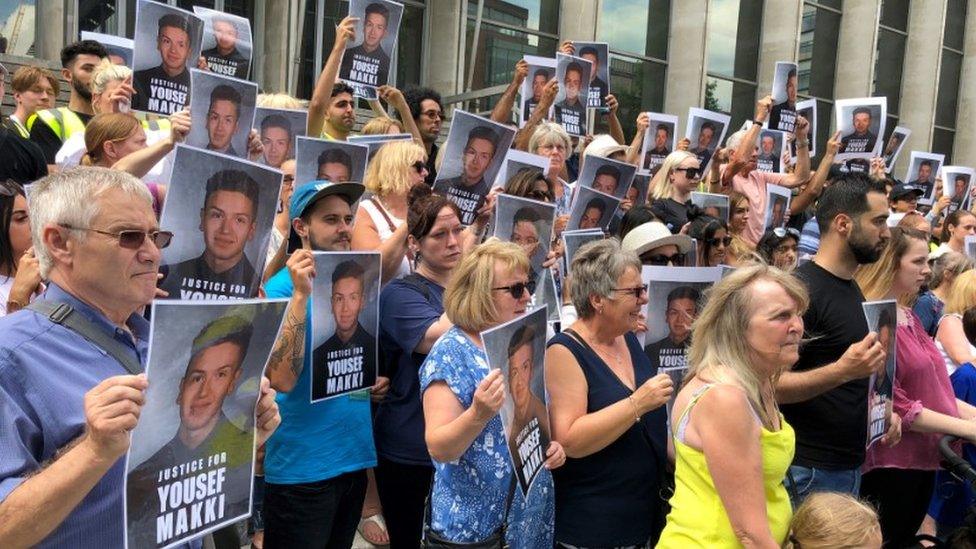Yousef Makki: Stabbed boy's family ask for sentences appeal
- Published

Yousef Makki, 17, was stabbed in the heart with a flick knife
The family of a teenager stabbed to death have called for a review of the sentences given to two boys in the case believing they were unduly lenient.
It comes after the boys were convicted following the death of Yousef Makki, 17, in Greater Manchester.
Boy A, who was cleared of murder and manslaughter, was detained for eight months and Boy B for four months, after both admitted possessing a knife.
The Attorney General's (AG) office says lawyers are "assessing" the sentences.
After applying to the AG for review, Yousef's family are to ask Geoffrey Cox QC to refer the sentences to the Court of Appeal under the unduly lenient sentence scheme, external.
"We believe that these sentences do not send the right message to society," said Ms Akoum.
'Wrongly applied'
Yousef died after being stabbed through the heart in Hale Barns, on 2 March.
Matthew Stanbury, a lawyer representing the family, said: "There are good arguments that the judge wrongly applied the sentencing guideline for the possession of bladed weapons, and didn't have sufficient regard to the aggravating features of the case.
"We hope that the Attorney General will now refer this case to the Court of Appeal to allow it to consider those arguments."

What were the two boys accused of?
Both defendants had previously admitted possessing a knife.
Boy A was charged with murder and manslaughter but cleared before he pleaded guilty to perverting the course of justice by lying to police.
Boy B was found not guilty of perverting the course of justice and conspiracy to rob.
Both boys were cleared of conspiracy to commit robbery in the lead-up to Yousef's death.

What is the unduly lenient sentence scheme?
The scheme lets people ask for a review in cases including murder, rape and terrorism.
Of particular interest in this case is that a perverting the course of justice conviction can also trigger a sentencing review.
The unduly lenient sentence scheme was launched in 1989 after a series of controversial court cases caused public outcry.
It is designed to let anyone ask for a serious crown court sentence from England or Wales to be reviewed by the Attorney General's Office.
Only one request is needed for the government to decide whether a sentence can be looked at again, but it must be lodged within 28 days of the ruling.
Under the scheme only certain types of case can be reviewed, including:
Murder
Rape
Robbery
Some child sex crimes and child cruelty
Some serious fraud
Some serious drug crimes
Some terror-related offences
Crimes committed because of a victim's race or religion
Perverting the course of justice

The AG's Office said it was "currently looking at a referral which falls under the Unduly Lenient Sentence scheme" relating to the Makki case.
But said it could not confirm who made the referral due to data protection legislation.
- Published25 July 2019

- Published24 July 2019

- Published12 July 2019
